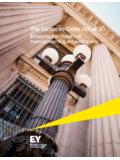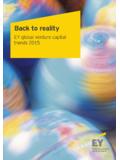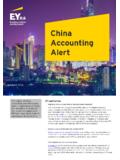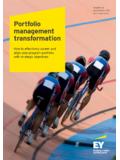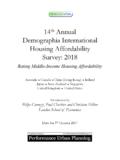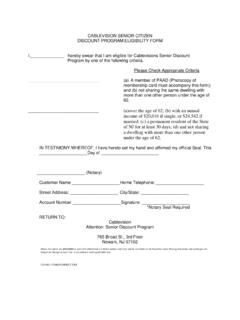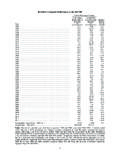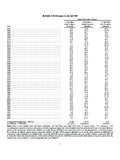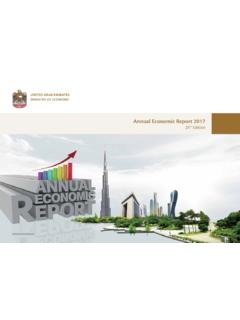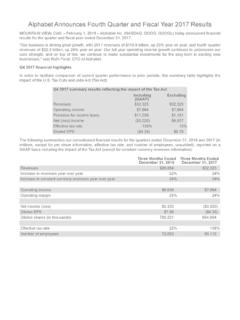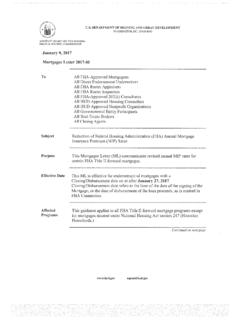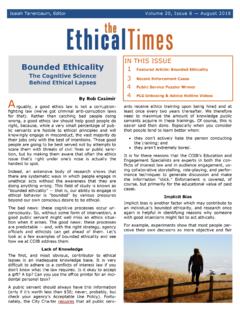Transcription of Annual reporting in 2016/17 - Ernst & Young
1 Annual reporting in 2016 /17: broad perspective, clear focusSeptember 2017 | Fourth editionWelcome 21. Purpose, business model and risks 14 Introduction 42. Wider stakeholder engagement, sustainability and culture 30 Executive summary 83. Governance reporting 38 Contents4. Future trends in reporting 485. Recent and upcoming reporting requirements 58 Appendices 641 Annual reporting in 2016 /17 While this has remained true to an extent, the uncertain environment following the Brexit referendum and the ensuing Government focus on corporate governance reignited a discussion of many reporting -related questions and proposals. The Government published its long awaited response to reform the UK s corporate governance framework on 29 August 2017. The reform proposals require the engagement of, and work by, several organisations but it is clear that reporting is a large part of the Government s solution set.
2 Change will come via revisions to the UK Corporate Governance Code as well as some secondary legislation to amend reporting requirements. Companies are increasingly being challenged on their role and broader contribution to society. The Annual report is an opportunity to articulate this clearly and engender support from a range of stakeholders. With this in mind, our report this year looks into the latest key areas of focus in corporate governance and how these are being reflected in Annual reporting . We have focused on the following areas: Purpose, business model and risks Wider stakeholder engagement, sustainability and culture Governance reporting Future trends in reporting , including views on preliminary announcements and analyst presentations Recent and upcoming reporting requirementsWe spoke to the Financial reporting Lab, ICSA: The Governance Institute, the Investment Association, HSBC Holdings plc and the Head of Equities at USS to hear their views on issues such as viability statements, digital reporting , stakeholder engagement, concise reporting and more.
3 Once again, we have included case studies, an updated acid test and an interactive aide m moire (available on our website) as practical tools for preparers aiming to enhance their 2017/18 reporting . For those looking for a quick read, our introductory Q&A and executive summary will be helpful. Our key findings show that the quality of Annual reporting in the FTSE 350 remains high and some boards and preparers are moving towards ensuring that their Annual reports are responsive to the new and changing expectations of investors, stakeholders and the public. However, there is still work to do in ensuring that a company s broader engagement with its stakeholders, and its reporting , is focused and specific to its strategy and operations. We look forward to hearing your feedback and WilliamsonHead of Corporate GovernanceEY UK & our review last year, Evolving communication in a changing world, we concluded that the year to come was likely to include few reporting changes, providing a window of opportunity for reporting to evolve to suit the needs and expectations of a changing economic and business world.
4 Welcome to our fourth review of Annual reports and accounts (ARAs) in the FTSE 350. 3 Annual reporting in 2016 /172Q What are your views about the increased demands being placed on Annual report preparers in recent years and do you think reporting in the FTSE 350 is moving in the right direction? Mala: Considering the Annual report alone, there has been a brief period of stability in the disclosures in the front half. This should have given companies time to refine and evolve their narrative reports. The standard of reporting across the FTSE 350 remains high. Companies are doing relatively well to keep up with new issues of interest to shareholders and stakeholders, such as culture, purpose and sustainability. However, there is still work to be done in these and other areas for example, viability statement reporting , stakeholder engagement and, in some cases, governance reporting to ensure disclosures are sufficiently specific to the company and focused on actions and outcomes, rather than just processes.
5 Most of the recent changes that companies have had to deal with in the last two years require reporting outside the ARA (on corporate websites or external portals) the gender pay gap, Modern Slavery Act, Payment Practices, etc. Boards and preparers must make sure that all these additive disclosures (whether in the ARA or outside) are viewed cohesively, as many are linked indirectly. reporting can sometimes be seen as an easy answer to complex issues. However, the key point is that underlying behaviours and processes have (in most cases) to be reviewed or changed too for the reporting change to really tackle the heart of the issue. There have been successes: for example, from companies we have spoken with, the disclosures required by the Modern Slavery Act led to companies looking at their supply chains more closely to understand the What do you see as the key areas of focus preparers should keep in mind for next year?
6 Ken: We have long felt that business model disclosures are very important and we continue to challenge preparers to effectively explain their value chain and competitive advantage, focusing on how their key tangible and intangible assets create value for a variety of stakeholders. This is especially important given the emerging dialogue between the public and the business community about the importance of articulating a broader purpose that encapsulates value creation beyond just financial value. Also, given the uncertainty in the business environment as well as the pace of disruption, it is important for companies to think about and articulate how their business models are capable of coping with new risks or indeed the opportunities presented by disruptive forces. Risk reporting is certainly moving in the right direction but viability statements seem to have stagnated, and in some cases, moved backwards.
7 In the sample of 100 reports we reviewed, average reported time horizons have reduced since the first published statements, and the specificity and quantification of scenario analysis and assumptions disclosure have not improved significantly. We would like to see more engagement with the investment community to ensure that these statements remain fit for purpose; otherwise the viability statement will just become a bland, boilerplate disclosure similar to the going concern disclosure it was designed to enhance. For the first time this year, we also compared (for a smaller sample) preliminary results announcements and analyst presentations to the Annual report. In the same way that it s important to ensure various sections of an Annual report are connected and overseen as a whole, we feel there s scope for ensuring more consistent messaging between these various communication channels.
8 Finally, with the focus on Section 172 of the Companies Act 2006, which addresses directors responsibilities for having regard to the company s wider stakeholders, preparers should bear in mind how consideration of this duty can be best disclosed. Many companies will already be actively engaging with their stakeholders but may not be giving themselves enough credit through their disclosures. The disclosures shouldn t just detail the activity or engagement channel; more importantly, they should also explain the issues discussed, the feedback received from stakeholders, and where relevant and material, how this has been taken into account into the board s decision-making process. Q In the last year, what impact do you think the business environment and Brexit have had on Annual reporting ? Mala: Public sentiment is increasingly concerned with non-financial issues and impacts.
9 This has resulted in a raft of new non-financial reporting regulations or proposals from various bodies. It is challenging for preparers to keep up with these while also ensuring that overall their corporate reporting (across the Annual report and other media) still tells a coherent story and discloses matters in sufficiently specific detail but without too much repetition. It is important for reporting to be clearly framed by the business model and strategy and also to explain how issues are overseen from a governance perspective. The discussion of Brexit in general features in many more reports this year (last year s ARAs were published before the referendum result), although only a small minority include it as a principal risk. Understandably, it is difficult to provide disclosures on issues that are shrouded in so much continuing uncertainty.
10 However, given the scale of the issue, if companies perhaps broke it down and examined impact (as well as reporting implications) on discrete aspects (for example, business model, strategy, prospects, risk and viability), they may be more able to provide assurance on how they are monitoring developments and considering the potential impact of various scenarios. We have summarised the key reporting considerations in relation to Brexit for boards and audit committees in Section 1: Purpose, business model and risks. Q Looking to the bigger picture and longer term, what changes to Annual report formats do you think we might see in the future?Ken: From what we ve gathered from our conversations with investors and regulators, the move to a completely digital Annual report is not quite imminent, in part due to the legal requirement for a hard copy Annual report to be submitted to Companies House, as well as user demand.


